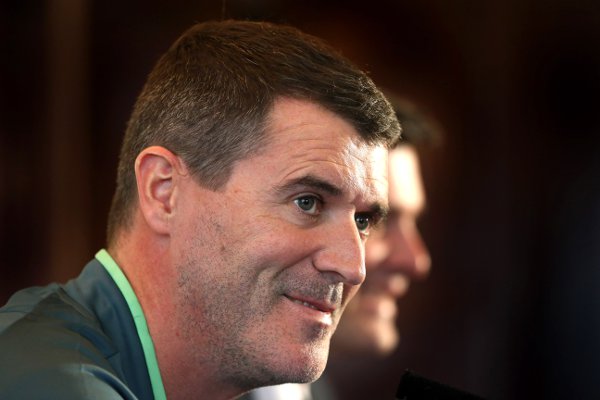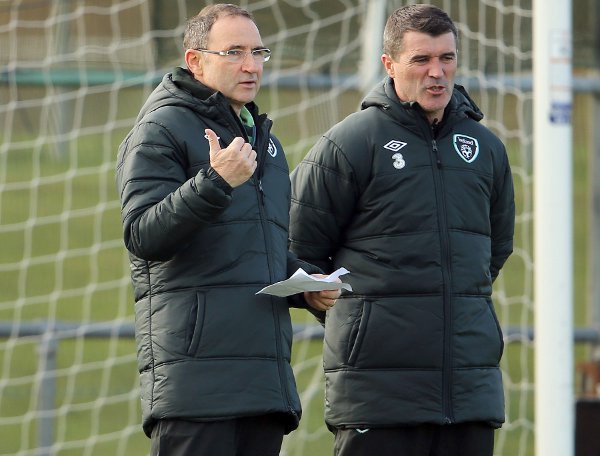IT MAY have escaped your attention but as well as naming Roy Keane as their new assistant, the FAI also handed Martin O’Neill a job last week.
That the man who took Leicester from the doldrums to two League Cup triumphs, and Celtic from Rangers’ shadow to a Uefa Cup final, should fall for the FAI’s advances is a major deal.
But in the eyes of the public, Keane’s arrival on the managerial ticket is a bigger one.
He is the box-office draw, Irish football’s matinee idol. O’Neill may be the number one but he better get used to living in his sidekick’s shadow.
Can his ego handle that? You’d like to think it can — because, at 61, he has lived a full-life, emerging from the law faculties of Queens University to survive the harsh world of 1970s football and the even harsher world of non-League management a decade later.
Infinitely more important than any of that, though, has been his wife, Geraldine’s, successful fight against cancer because when a family goes through that kind of pain, guidelines and perspectives get redrawn.
So we shouldn’t worry too much about the sensitivities of Martin Hugh Michael O’Neill.
He’s more than able to handle himself, a point the sports editor of the Nottingham Evening Post discovered in the early 1970s after he penned a critical column of the Derryman, implicitly questioning his intelligence.
O’Neill’s beautifully written reply, with reference to his law degree, put the accuser in his place. Handling Brian Clough was a trickier prospect, though.
In Duncan Hamilton’s biography of the two-time European Cup winning manager, tales of tension between the pair are ever-present.
 Roy Keane met the Irish press on Wednesday. ©INPHO/Cathal Noonan
Roy Keane met the Irish press on Wednesday. ©INPHO/Cathal Noonan“Martin was a smart-arse,” said Clough, “so I decided to handle him by pretending he was thick, thinking that might shut him up.
It never worked. He could talk for Ireland.” In time, Clough grew to respect O’Neill, essentially because he found a like-minded individual who was unafraid of his manager’s, or for that matter anyone’s, reputation.
With that sort of grounding, the prospect of taming Keane is less of a challenge than many think.
In any case, the biggest professional challenge of O’Neill’s career occurred long ago and a world away from the bright lights of The Aviva Stadium.
He was 34, washed up as a player and financially insecure, as he contemplated how to approach the sporting afterlife.
A call came from Grantham Town in the Midlands Division of the Beezer Homes League and he took it, not just because he needed the money, but also because he wanted to recapture the buzz of a Saturday afternoon when a win or a loss dictates your mood for the next three days.
Yet there was also another factor at play. At Forest, he may have won the League, the League Cup and the European Cup, but he retired dissatisfied with his lot.
The over-achiever actually felt he had underachieved and the last 27 years have been spent trying to erase that emotion.
And to a certain degree he has, putting Wycombe Wanderers on the map as well as in the Football League before he turned Leicester into an unexpected but formidable force.
“Anybody who can do anything in Leicester but make a jumper has got to be a genius,” said Clough.
O’Neill, though, can be a spiky genius and having seen the effect of that letter to the Nottingham Post’s sports editor, he took the pen out again in 1996, after leading Leicester to the Premier League, replying to the dozens of supporters who had written abusive letters to him during his early, unsuccessful period at the club.
“Ego, pride, call it what you will but I genuinely want to be successful in football,” says O’Neill.
“I can honestly say I still have the same determination now than when I was 20. I’m older but I am still exactly the same. Being competitive is important to me.
“When I was a player, I used to look to whoever was managing the team and I felt that if he wasn’t competitive, we had an excuse as players not to be competitive staring right back at us.”
So we can expect a fighter, something this Irish team badly needs after 18 months of waving the white flag at whatever foreign force presented itself for a scrap.
But what else can we hope for from this intriguing character who took his then pregnant wife to the Old Bailey to sit in the public dock during the Yorkshire Ripper’s trial, who visited Lower Belgrave Street in London’s Mayfield to retrace the last known steps of Lord Lucan, after he murdered his nanny, Sandra Rivett?
In a week we will find out when he visits the scene of another crime — a sporting one in Poznan, the city where Croatia and Italy outplayed Ireland in Euro 2012.
Since then, results have headed further south and with a team in need of a pick-me-up, the arrival of a man whose abilities to coax players to degrees of excellence they never believed possible, is vital.
We go back in time again, this time to 2003 and Anfield Road. It is the quarter-final of the Uefa Cup and Liverpool have the edge after holding Celtic to a draw in the first leg at Celtic Park.
It is 15 minutes to kick off and O’Neill stands to deliver what Henrik Larsson has since described as “the best speech ever heard in a dressing room”. “You’re 31, you’re 30, you’re 30, you’re 29,” he said pointing at Paul Lambert, John Hartson, Chris Sutton and Larsson.
 Martin O'Neill and Roy Keane on the Ireland training pitch in Malahide yesterday. ©INPHO/Cathal Noonan
Martin O'Neill and Roy Keane on the Ireland training pitch in Malahide yesterday. ©INPHO/Cathal Noonan“People have accused you of taking the easy option going to Scotland — and 1995 was a long time ago, Chris. They’ve said you’re all not good enough to get a club in England.
"If you lose here, you’ll be out of people’s heads by Friday. Win and you’ll never be forgotten in Glasgow.”
Everybody who witnessed the glorious performance that followed strongly believed that O’Neill would replace Gerard Houllier in the Anfield dug-out.
But that call never came. Nor did one come from Old Trafford or White Hart Lane or Stamford Bridge — or from England.
Instead, after Celtic, he landed at Aston Villa and Sunderland, where American owners got a little jumpy and acrimonious departures followed.
The Sunderland wounds have yet to heal and coming to Ireland is seen as an opportunity for therapy as well as work. “I still have a lot to offer but I still have a lot to prove,” says O’Neill.
For those who wonder if his career has peaked, the fact he wants to climb the mountain again is heartening.
That Keane is there to share the journey could be a masterstroke, providing that is, he doesn’t push him over the edge.

